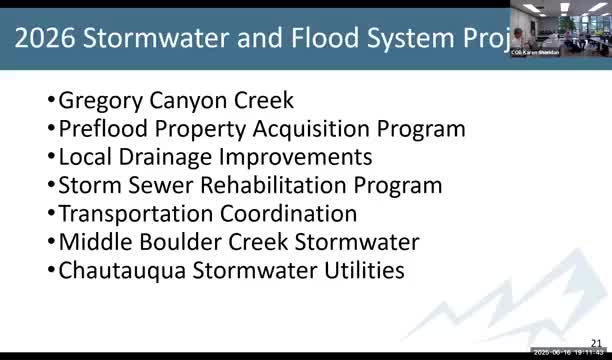Boulder Utilities propose rate increases to fund essential infrastructure projects
June 19, 2025 | Boulder, Boulder County, Colorado
Thanks to Scribe from Workplace AI , all articles about Colorado are free for you to enjoy throughout 2025!

This article was created by AI using a video recording of the meeting. It summarizes the key points discussed, but for full details and context, please refer to the video of the full meeting. Link to Full Meeting
One of the key topics was the ongoing acquisition program, which aims to secure properties for future utility projects. Officials noted that while they strive to purchase one property each month, rising property values are making this goal increasingly challenging. This highlights the delicate balance between maintaining infrastructure and managing costs in a rapidly changing economic landscape.

Before you scroll further...
Get access to the words and decisions of your elected officials for free!
Subscribe for FreeThe board also reviewed a list of interdepartmental projects, emphasizing collaboration between utilities and other city departments. A notable example discussed was the development of Primoz Park in North Boulder, which not only serves recreational needs but also incorporates flood management features due to a stream running through the area. This project exemplifies the city’s commitment to integrating environmental considerations into urban planning.
Financial discussions revealed proposed rate increases for 2026, including an 8% hike in water rates, a 6% increase in wastewater rates, and a 5% rise in stormwater and flood rates. These adjustments are designed to ensure the long-term financial health of the utilities while addressing inflation and capital spending needs. For an average single-family home, this translates to an increase of approximately $9.18 per month. Officials stressed the importance of these increases in maintaining essential services, even as they acknowledged the burden on residents.
The meeting also touched on the city’s efforts to support low-income residents through assistance programs, ensuring that those who struggle to pay their bills are not left behind. Board members expressed a commitment to enhancing these programs, recognizing that while most residents can afford the increases, it is crucial to safeguard the most vulnerable members of the community.
As the meeting concluded, the board members reflected on the importance of strategic planning and community engagement in navigating the challenges ahead. With a focus on sustainable growth and responsible financial management, Boulder City is poised to tackle its water resource needs while fostering a resilient and inclusive community.
Converted from 6-16-25 Water Resources Advisory Board Meeting meeting on June 19, 2025
Link to Full Meeting
Comments
View full meeting
This article is based on a recent meeting—watch the full video and explore the complete transcript for deeper insights into the discussion.
View full meeting




